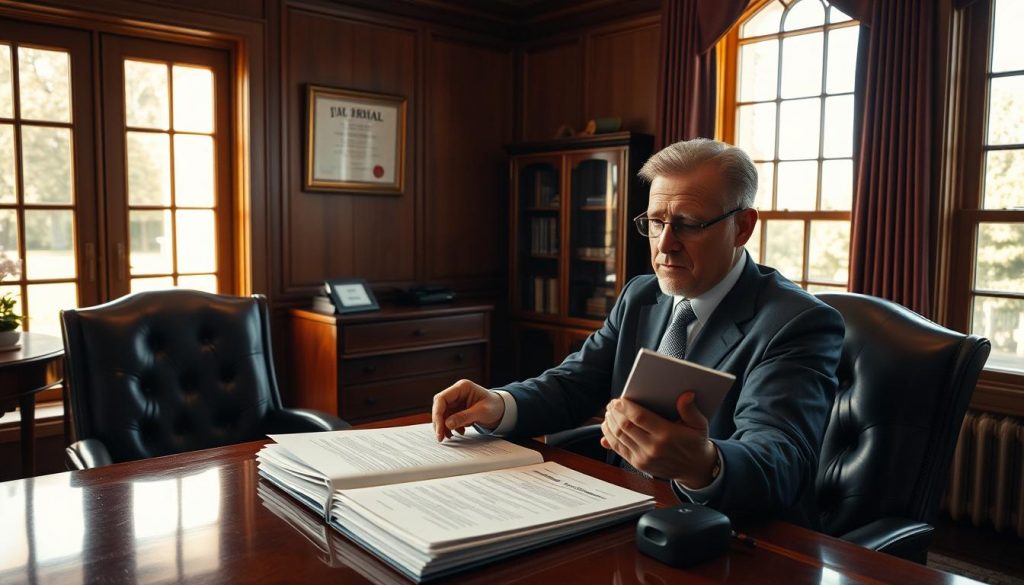Dealing with the estate of a deceased loved one can be a challenging and emotional experience. Understanding how to access their will is a crucial step in managing their estate effectively. We are here to guide you through this process, ensuring you have the necessary information to make informed decisions.
The Principal Probate Registry is a key resource, holding copies of wills proved in England or Wales after 1858. This registry plays a vital role in the administration of estates, providing a central location for storing and accessing wills.
Key Takeaways
- Accessing a will is essential for managing a deceased person’s estate.
- The Principal Probate Registry holds copies of wills proved in England or Wales after 1858.
- Understanding the process of locating a will can help families make informed decisions.
- Locating a will can be a complex task, but with the right guidance, it can be done efficiently.
- Families can rely on the Principal Probate Registry as a key resource.
Understanding Wills and Their Importance
A will is more than just a legal document; it’s a way to ensure your wishes are respected after you’re gone. Having a will in place can provide peace of mind for you and your loved ones, knowing that your estate will be distributed according to your desires.
What is a Will?
A will, also known as a last will and testament, is a legal document that outlines how a person’s estate should be distributed after their death. It allows individuals to specify who should inherit their assets, including property, money, and personal belongings. By having a will, individuals can ensure that their wishes are carried out and that their loved ones are taken care of.
Why Have a Will?
Having a will is crucial for several reasons. Firstly, it ensures that your estate is distributed according to your wishes, rather than being decided by the courts. This can help reduce the burden on your loved ones during a difficult time. Secondly, a will can help minimize disputes among family members by clearly outlining your intentions. Lastly, having a will can also help reduce the amount of inheritance tax payable by your estate.
“A will is a declaration of your wishes, and it’s essential to make sure it’s done correctly to avoid any potential disputes or issues.”
Different Types of Wills
There are several types of wills that individuals can consider, depending on their circumstances. These include:
- Simple Will: This is the most common type of will, used for straightforward estate planning.
- Mirror Will: A mirror will is a pair of wills made by two people, typically spouses, that mirror each other.
- Living Will: A living will, also known as an advance directive, outlines a person’s wishes regarding medical treatment if they become unable to communicate.
| Type of Will | Description | Benefit |
|---|---|---|
| Simple Will | Used for straightforward estate planning | Easy to create and understand |
| Mirror Will | Made by two people, typically spouses | Ensures both parties’ wishes are aligned |
| Living Will | Outlines medical treatment wishes | Provides clarity in critical situations |
Understanding the different types of wills and their significance can help individuals make informed decisions about their estate planning. By having a will, individuals can ensure that their wishes are respected and that their loved ones are protected.
When You May Need to See a Will
There are specific situations where viewing a will becomes necessary, such as after a death or during family disputes. Understanding these scenarios can help you navigate complex family situations and ensure that the deceased’s wishes are respected.
After a Death
After someone dies, their will is often needed to settle their estate. This involves distributing their assets according to their wishes as outlined in the will. Accessing the will is a critical step in this process, as it provides the necessary instructions for the distribution of the estate.
The process typically involves the executor of the will, who is responsible for carrying out the instructions in the will. If you’re a beneficiary or a family member, you may need to view the will to understand your inheritance and the overall distribution plan.
| Role | Responsibilities |
|---|---|
| Executor | Carries out the instructions in the will, manages the estate, and distributes assets according to the will. |
| Beneficiary | Receives assets or inheritance as specified in the will. |
| Family Members | May need to view the will to understand the distribution of the estate and their potential inheritance. |
During Family Disputes
Family disputes can arise when there’s a disagreement about the distribution of the estate or the validity of the will. In such cases, discovering the will can help resolve conflicts by clarifying the deceased’s intentions.
If you’re involved in a family dispute related to a will, it’s essential to understand your rights and the legal framework surrounding wills. Seeking professional advice can be beneficial in navigating these complex situations.

Legal Requirements for Viewing a Will
In the UK, the legal requirements for viewing a will are clearly defined to ensure that the deceased’s wishes are respected and carried out.
To search will or retrieve a will, certain individuals have the legal right to do so. This includes beneficiaries named in the will and those with a legitimate interest in the estate.
Who Can Request to See a Will?
The following individuals can request to see a will:
- Beneficiaries named in the will
- Executors of the will
- Those with a legitimate interest in the estate, such as family members or dependents
It’s essential to understand that not everyone can access a will. The law protects the privacy of the deceased and their estate.
The Role of the Executor
The executor plays a crucial role in managing the estate and ensuring that the deceased’s wishes are carried out. Their responsibilities include:
| Responsibility | Description |
|---|---|
| Applying for Probate | Obtaining the legal right to manage the estate |
| Managing the Estate | Collecting assets, paying debts, and distributing the estate according to the will |
| Communicating with Beneficiaries | Keeping beneficiaries informed about the progress of the estate administration |
If you’re an executor or a beneficiary, understanding your rights and responsibilities is vital. We recommend seeking professional advice if you’re unsure about any aspect of the process.

By understanding the legal requirements for viewing a will, you can ensure that you’re taking the right steps to access the information you need.
How to Obtain a Copy of a Will
To check will details and understand how to see a will, it’s essential to know the right steps to take. Obtaining a copy of a will is a crucial process that involves several key actions. We will guide you through the necessary steps to access this important document.
Contacting the Executor
The first step in obtaining a copy of a will is to contact the executor of the estate. The executor is responsible for managing the deceased’s estate according to their wishes as outlined in the will. To contact the executor, you can start by:
- Checking the deceased’s personal belongings for any documents that may list the executor’s contact information.
- Reaching out to the deceased’s solicitor or legal representative, as they often have the executor’s details.
- Contacting family members or friends who may be able to provide the executor’s contact information.
Once you have the executor’s contact details, you can reach out to them to request a copy of the will. Be prepared to provide identification and your relationship to the deceased.
Visiting Probate Registries
If contacting the executor is not feasible or they are unresponsive, you can visit a probate registry to obtain a copy of the will. The Principal Probate Registry in the UK holds copies of wills proved in England or Wales after 1858. Here’s how you can access these records:
- Locate the nearest probate registry or a local record office.
- Check if they have the will in their records. You may need to provide the deceased’s name and date of death.
- If the will is registered, you can request a copy. Be aware that there may be a fee for this service.
It’s worth noting that the process may vary slightly depending on the specific circumstances and the registry’s procedures.
| Method | Description | Potential Costs |
|---|---|---|
| Contacting the Executor | Reach out to the executor directly for a copy of the will. | No official fee, but may incur costs for solicitor’s assistance. |
| Visiting Probate Registries | Access will records at a probate registry. | Fee for copying and potentially for solicitor’s help. |
By following these steps, you can obtain a copy of the will and ensure that the estate is managed according to the deceased’s wishes. We are here to guide you through this process, providing the necessary support and information.
Accessing Wills Through Probate
Probate is a vital process that allows you to locate a will and manage the estate accordingly. When a person passes away, their will must be verified to ensure it is genuine and reflects their final wishes.
What is Probate?
Probate is the legal process of verifying a will and granting authority to the executor to manage the deceased’s estate. This process involves checking the will’s authenticity, identifying the executor, and ensuring that the deceased’s assets are distributed according to their wishes. It’s a crucial step in the administration of an estate, providing a clear and legal framework for managing the deceased’s affairs.

The Process of Obtaining Probate Records
To find a will, you typically need to access probate records. Here’s a step-by-step guide:
- Identify the probate registry: You’ll need to contact the relevant probate registry where the will is stored.
- Request a copy of the will: You can request a copy of the will from the probate registry, usually by filling out a specific form.
- Provide necessary details: Be prepared to provide the deceased’s name, date of death, and other relevant information.
- Pay the required fee: There is usually a fee associated with obtaining a copy of the will.
By following these steps, you can access the probate records and obtain a copy of the will, ensuring that you can proceed with managing the estate according to the deceased’s wishes.
Fees and Costs Associated with Viewing a Will
The process of obtaining a copy of a will comes with certain fees. Understanding these costs can help you plan and budget for the process of accessing the will.
Typical Fees for Copying Wills
When you request a copy of a will, you may be charged a fee for the copying service. The cost can vary depending on the length of the will and the number of pages. Typically, you can expect to pay a few pounds for a standard will. For instance, the Principal Probate Registry charges £1.50 per page for a copy of the will, with a minimum fee applying.
Additional Costs Incurred in the Process
Apart from the copying fees, there may be additional costs associated with accessing a will. These can include search fees if you’re looking for a will through a probate registry or solicitor’s records. In some cases, you might also incur costs if you need to contest the will or resolve disputes related to the estate. It’s essential to be aware of these potential expenses to avoid unexpected financial burdens.
To give you a clearer idea, here are some potential costs you might encounter:
- Copying fees: £1.50 per page
- Search fees: Varying costs depending on the service
- Solicitor fees: For professional assistance with accessing or contesting a will
By understanding these costs upfront, you can better navigate the process of accessing a will and ensure that you’re prepared for any expenses that may arise.
Searching for a Will Online
Searching for a will online can be a straightforward process if you know where to look. The UK provides various online resources that can aid in discovering a will, making it easier for families to access the information they need.
Useful Online Resources
Several online resources are available to help you search for a will. One of the primary resources is the Principal Probate Registry’s index to wills and administrations. This index is a valuable tool that allows you to search for wills and administrations online.
Some of the key online resources include:
- The Probate Service’s website, which provides access to the index of wills and administrations.
- Online genealogy platforms that often have extensive records of wills and probate documents.
- Local authority websites that may provide information on wills and probate.
When using these resources, it’s essential to have as much information as possible about the deceased, such as their name, date of death, and last known address, to facilitate an accurate search.
Limitations of Online Searches
While online resources are incredibly useful, there are limitations to searching for a will online. Not all wills are digitized or available online, particularly older wills or those not registered with the Probate Service.
Some of the limitations include:
| Limitation | Description |
|---|---|
| Limited Access to Older Wills | Older wills may not be digitized and thus are not available online. |
| Registration Requirements | Wills need to be registered with the Probate Service to be included in their online index. |
| Information Accuracy | The accuracy of the search results depends on the information provided. |
Understanding these limitations can help you plan your next steps and ensure that you can access the will if it’s not available online.
The Role of Solicitors in Accessing Wills
In the UK, solicitors are essential in facilitating the retrieval of wills and ensuring that the deceased’s wishes are respected. Their expertise can significantly simplify the process for families dealing with the loss of a loved one.
How Solicitors Can Help
Solicitors can provide invaluable assistance in accessing wills by offering professional guidance and support. They can help individuals understand the legal requirements and procedures involved in retrieving a will. Some of the key ways solicitors can assist include:
- Guiding clients through the process of obtaining a grant of probate, which is necessary for accessing the deceased’s estate.
- Assisting in the interpretation of the will, ensuring that the deceased’s intentions are understood and carried out.
- Providing advice on the legal implications of the will and helping to resolve any disputes that may arise.
By leveraging their expertise, solicitors can help reduce the stress and complexity associated with accessing a will, allowing families to focus on their emotional well-being during a difficult time.
Choosing the Right Solicitor
Selecting the right solicitor is crucial for ensuring that the process of accessing a will is handled efficiently and effectively. When choosing a solicitor, consider the following factors:
- Experience: Look for solicitors with a proven track record in handling wills and estate planning.
- Expertise: Ensure that the solicitor has the necessary expertise in the relevant area of law.
- Communication: Choose a solicitor who communicates clearly and is responsive to your needs.
By choosing a solicitor with the right combination of experience, expertise, and communication skills, you can ensure that the process of retrieving a will is handled with care and professionalism.
Handling Disputes Over Wills
Disputes over wills can be emotionally taxing and legally complex, requiring a nuanced approach to resolve. When a loved one passes away, their will can become a focal point of contention among family members, often due to misunderstandings or unmet expectations.
Common Reasons for Disputes
Disputes over wills often arise due to contested validity or disagreements among beneficiaries. Some common reasons include:
- Concerns about the deceased’s mental capacity when making the will
- Allegations of undue influence or coercion
- Disagreements over the distribution of assets
- Questions about the will’s authenticity
Understanding these potential flashpoints can help you navigate complex family situations and ensure that the deceased’s wishes are respected.
Steps to Resolve Disputes
Resolving disputes over wills requires a careful and considered approach. Here are some steps you can take:
- Seek Professional Advice: Consulting with a solicitor who specializes in probate law can provide valuable guidance on how to proceed. They can help you understand your rights and the legal options available.
- Mediation: Mediation can be an effective way to resolve disputes without resorting to litigation. A neutral third-party mediator can facilitate discussions and help parties reach a mutually acceptable agreement.
- Review the Will: Carefully examine the will and any related documents to understand the deceased’s intentions. This can help clarify any misunderstandings and provide a basis for resolving disputes.
- Open Communication: Encouraging open and honest communication among family members can help to resolve tensions and find a resolution that respects the deceased’s wishes.
For more information on the importance of having a will, you can visit our page on the importance of having a will in the. By understanding the steps involved in resolving disputes, you can better navigate these challenging situations and ensure that the deceased’s wishes are respected.
Final Thoughts on Accessing a Will
Understanding your rights and the processes involved in accessing a will can help you navigate complex situations. When a loved one passes away, finding their will is a crucial step in managing their estate.
Rights and Processes
Knowing who can request to see a will and how to access the will document is essential. This knowledge helps ensure that the deceased’s wishes are respected and that the estate is managed according to their intentions.
Open Communication
Encouraging open communication among family members can help prevent disputes and ensure a smooth process. By understanding the importance of transparency and cooperation, you can work together to find the will and carry out the deceased’s wishes.

